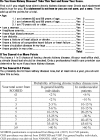Screening for kidney disease in vascular patients: SCreening for Occult REnal Disease (SCORED) experience
- PMID: 19324913
- PMCID: PMC2734171
- DOI: 10.1093/ndt/gfp124
Screening for kidney disease in vascular patients: SCreening for Occult REnal Disease (SCORED) experience
Abstract
Background: SCreening for Occult REnal Disease (SCORED) is a novel screening guideline recently developed to identify individuals with a high likelihood of having prevalent chronic kidney disease (CKD). This simple scoring system, developed from general US representative samples and independently validated, was shown to outperform current clinical practice guidelines. Recently, CKD screening in individuals with cardiovascular disease (CVD) has been emphasized. We therefore evaluated the SCORED model in CVD patients in order to better understand the implications of CKD screening in this population.
Methods: Two clinical trials that enrolled patients with heart attack (N = 2481) or stroke (N = 3680) were combined to create our sample. The performance of the SCORED guideline was evaluated by standard diagnostic measures. Correlations among various risk scores and their predictive abilities for recurrent CVD were ascertained.
Results: For heart attack and stroke patients, respectively, the SCORED guideline yielded sensitivity of 94 and 97%, specificity of 27 and 11%, positive predictive value of 32 and 30%, negative predictive value of 93 and 89%, with AUC of 0.75 and 0.68. SCORED was strongly correlated with other risk scores and exhibited a similar performance in the prediction of recurrent CVD.
Conclusions: The higher risk of CKD in CVD patients with high SCORED values is demonstrated. This simple education and screening tool may help promote awareness of CKD in CVD patients, in addition to general populations, and assess the CKD risk and its relationship with recurrent CVD.
Figures
Similar articles
-
SCreening for Occult REnal Disease (SCORED): a simple prediction model for chronic kidney disease.Arch Intern Med. 2007 Feb 26;167(4):374-81. doi: 10.1001/archinte.167.4.374. Arch Intern Med. 2007. PMID: 17325299
-
Cardiovascular outcomes and all-cause mortality: exploring the interaction between CKD and cardiovascular disease.Am J Kidney Dis. 2006 Sep;48(3):392-401. doi: 10.1053/j.ajkd.2006.05.021. Am J Kidney Dis. 2006. PMID: 16931212
-
CKD and cardiovascular disease in screened high-risk volunteer and general populations: the Kidney Early Evaluation Program (KEEP) and National Health and Nutrition Examination Survey (NHANES) 1999-2004.Am J Kidney Dis. 2008 Apr;51(4 Suppl 2):S38-45. doi: 10.1053/j.ajkd.2007.12.017. Am J Kidney Dis. 2008. PMID: 18359407
-
Clinical epidemiology of cardiovascular disease in chronic kidney disease.Nephron Clin Pract. 2005;101(2):c47-52. doi: 10.1159/000086221. Epub 2005 Jun 7. Nephron Clin Pract. 2005. PMID: 15942250 Review.
-
Clinical epidemiology of cardiovascular disease in chronic kidney disease prior to dialysis.Semin Dial. 2003 Mar-Apr;16(2):101-5. doi: 10.1046/j.1525-139x.2003.16025.x. Semin Dial. 2003. PMID: 12641872 Review.
Cited by
-
Risk models to predict chronic kidney disease and its progression: a systematic review.PLoS Med. 2012;9(11):e1001344. doi: 10.1371/journal.pmed.1001344. Epub 2012 Nov 20. PLoS Med. 2012. PMID: 23185136 Free PMC article.
-
Chapter 2: Definition, identification, and prediction of CKD progression.Kidney Int Suppl (2011). 2013 Jan;3(1):63-72. doi: 10.1038/kisup.2012.65. Kidney Int Suppl (2011). 2013. PMID: 25018976 Free PMC article. No abstract available.
-
Comparison of screening scores for diabetes and prediabetes.Diabetes Res Clin Pract. 2016 Aug;118:146-53. doi: 10.1016/j.diabres.2016.06.022. Epub 2016 Jun 18. Diabetes Res Clin Pract. 2016. PMID: 27371780 Free PMC article.
-
The Factors Influencing Chronic Kidney Disease Incidence: Database from the Korean National Health Insurance Sharing Service (NHISS).J Clin Med. 2024 Apr 9;13(8):2164. doi: 10.3390/jcm13082164. J Clin Med. 2024. PMID: 38673437 Free PMC article.
-
Estimating Residual Native Kidney Urea Clearance in Hemodialysis Patients with and without 24-Hour Urine Volume.Kidney Med. 2019 Nov-Dec;1(6):376-382. doi: 10.1016/j.xkme.2019.08.003. Epub 2019 Oct 22. Kidney Med. 2019. PMID: 32462139 Free PMC article.
References
-
- Coresh J, Byrd-Holt D, Astor BC, et al. Chronic kidney disease awareness, prevalence, and trends among U.S. adults, 1999 to 2000. J Am Soc Nephrol. 2005;16:180–188. - PubMed
-
- Coresh J, Selvin E, Stevens LA, et al. Prevalence of chronic kidney disease in the United States. JAMA. 2007;298:2038–2047. - PubMed
-
- Brosius FR, Hostetter T, Kelepouris E, et al. The National Kidney Foundation. Detection of chronic kidney disease in patients with or at increased risk of cardiovascular disease: a science advisory from the American Heart Association Kidney and Cardiovascular Disease Council; the Councils on High Blood Pressure Research, Cardiovascular Disease in the Young, and Epidemiology and Prevention; and the Quality of Care and Outcomes Research Interdisciplinary Working Group. Circulation. 2006;114:1083–1087. - PubMed
-
- Bang H, Vupputuri S, Shoham DA, et al. SCreening for Occult REnal Disease (SCORED): a simple prediction model for chronic kidney disease. Arch Intern Med. 2007;167:374–381. - PubMed
-
- Bang H, Mazumdar M, Kern LM, et al. Validation and comparison of a novel screening guideline for kidney disease: KEEPing SCORED. Arch Intern Med. 2008;168:432–435. - PubMed
Publication types
MeSH terms
Grants and funding
LinkOut - more resources
Full Text Sources
Other Literature Sources
Medical


